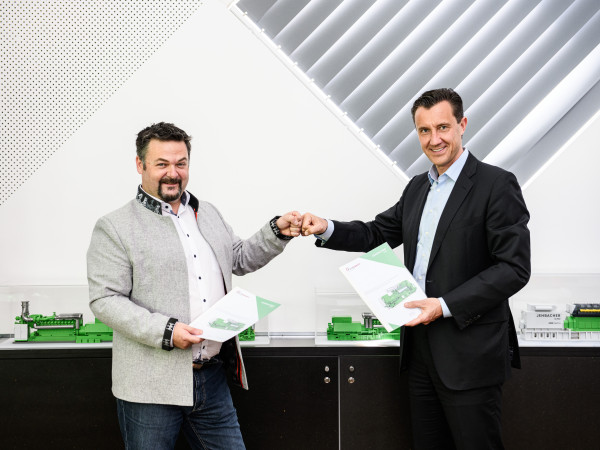• Thousands of operating hours demonstrate the success of joint efforts to optimize Jenbacher gas engines for use in SynCraft wood gas power plants.
• INNIO is supplying Jenbacher gas engines for two new SynCraft wood gas power plants in Upper Austria
• New joint projects planned for Germany and outside Europe

JENBACH, May 12, 2021 –
INNIO Jenbacher receives two new orders to supply gas engines for innovative SynCraft wood gas power plants. As a result, the two Tyrolean companies, who have collaborated on successful joint projects for many years, have set another milestone in the growing use of biomass for power generation. SynCraft wood gas power plants equipped with Jenbacher gas engines are already successfully operating in Austria, Germany, Italy, Croatia, Switzerland, and Japan, with new projects in Germany, Austria, and Japan currently at an advanced stage of planning.
Exemplary wood gas power plant projects
INNIO will supply two Jenbacher J412 gas engines, each with an electrical output of 500 kW, for the two new SynCraft wood gas power plants in Upper Austria. Each year the two units will process a total of 6,000 metric tons of residual wood from the wood industry into 7,000,000 kWh of renewable power and 10,000,000 kWh of heat. The two power plants will generate a total 7,000 metric tons of CO2 savings[1] annually.
They are of a similar scale to the recently commissioned wood gas power plant belonging to Croatian furniture manufacturer TERSA which is installed in the old warehouse at its former sawmill. Here a total of up to 3,000 metric tons of residual wood are converted into 3,000,000 kWh of power, 4,500,000 kWh of heat energy, and 400 metric tons of biochar each year, saving a total[2] of up to 3,000 metric tons of CO2 annually. The wood gas power plant has a total efficiency of up to 92%.
SynCraft and INNIO Jenbacher are also currently in the final phase of installing one of the world’s largest gas engine-powered wood gas power plants, with an electrical output of 4 MW, in Frauenfeld, Switzerland. Future plans call for 25,000 metric tons of residual, storm-damaged or infested wood to be used to generate energy at the innovative, jointly optimized facility, supplying the city of Frauenfeld and a local sugar factory with environmentally friendly and sustainable power and heating.
Exploiting synergies for green power generation
The use of biomass for decentralized power and heat generation is an increasingly important aspect of the energy transition and associated decarbonization. In contrast to wind and sun, regrowing raw materials such as wood are constantly available and can be used in the form of wood gas to generate power and heat in SynCraft wood gas power plants operated using Jenbacher gas engines. Wood gas has a hydrogen content of around 40%. These plants achieve a fuel utilization rate of up to 92%, as well as offer another valuable advantage: in contrast to conventional plants, they produce high quality biochar, rather than ash.
INNIO Jenbacher and SynCraft collaborate closely to develop their products in terms of output, efficiency, and lifecycle costs, while simultaneously achieving the highest possible levels of plant availability, in order to optimize the overall cost effectiveness of the wood gas power plant.
“SynCraft is dedicated to exploiting synergies. INNIO Jenbacher is an excellent partner to raise awareness around the world of the enormous potential of biomass for power generation and cooperating to build innovative and highly efficient wood gas power plants,” says Marcel Huber, SynCraft founder and CEO.
“I am delighted that the results of our long and close collaboration with SynCraft are being so well received in the industry. We will continue to use our synergies and expand our collaboration, jointly driving the energy transition by efficiently exploiting the renewable energy source wood in the form of wood gas ,” explains Carlos Lange, President and CEO of INNIO.
In 2021, EcoVadis awarded INNIO a silver medal to honor its engagement for a climate-neutral, greener, and more secure energy future. This places INNIO Jenbacher in the top 17% of its peers working towards sustainability.
About INNIO
INNIO is a leading provider of renewable gas, natural gas, and hydrogen-based solutions and services for power generation and gas compression at or near the point of use. With our Jenbacher and Waukesha gas engines, INNIO helps to provide communities, industry, and the public access to sustainable, reliable, and economical power ranging from 200 kW to 10 MW. We also provide life-cycle support and digital solutions for the more than 53,000 delivered gas engines globally, through our service network in more than 100 countries. We deliver innovative technology driven by decarbonization, decentralization, and digitalization to help lead the way to a greener future. Headquartered in Jenbach, Austria, the business also has primary operations in Welland, Ontario, Canada, and Waukesha, Wisconsin, U.S. For more information, visit the company’s website at www.innio.com. Follow INNIO on Twitter and LinkedIn.
About SynCraft
High-efficiency, resource-friendly, and climate-positive energy production:
For over ten years now, SynCraft, the Austrian high-tech company based in Schwaz, Tyrol, has been building and installing climate-positive energy systems around the world which use forest residual wood to generate power, heat, and valuable biochar. In 2020 alone, the company commissioned as many turnkey plants as in the first ten years since its founding in 2009, including projects in Japan. It is currently completing its 26th energy system. In 2020 the company received two prestigious awards, the Energy Globe Award, and the TRIGOS Award, for its innovative technology which is the result of years of internal research and development activities.
For further information please contact:
Susanne Reichelt
INNIO
+43 664 80833 2382
[1] Compared to electricity generated from natural gas (499 g CO2e/kWh) and heat production (280 g CO2e/kWh) and to a reduced Carbon Removal Factor for the generated charcoal of 3:1 (CO2:C).
[2] Compared to electricity generated from natural gas (499 g CO2e/kWh) and heat production (280 g CO2e/kWh) and a reduced Carbon Removal Factor for the generated charcoal of 3:1 (CO2:C).